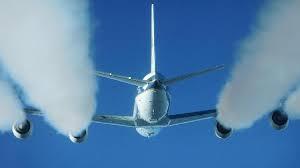How aviation contributes to global warming
Apr 13, 2023
This essay explains how aviation contributes to global warming.
Aviation is one of the most important contributors to climate change. The burning of airplane fuel releases carbon dioxide, nitrogen oxides and other greenhouse gases into the atmosphere that trap heat and contribute to warming the planet. Aircraft also emit water vapor, sulfur dioxide, ozone and other pollutants which can further increase temperatures locally by trapping additional heat in the lower atmosphere. Additionally, contrails – a visible vapor trail left behind aircraft – can slowly disperse over time and act likes clouds, further trapping additional heat within them.
The Intergovernmental Panel on Climate Change (IPCC) estimates that emissions from aviation account for about 3% of all global human-caused emissions each year - making it one of the largest sources of greenhouse gases in the transportation sector. Furthermore, aircraft emissions are projected to increase substantially over the next two decades, as air travel continues to become more affordable and accessible.

It is important to note that current estimates do not yet factor in any additional warming effects from contrails or other pollutants emitted by planes. These impacts could further increase aviation’s contribution to global warming, making it even more crucial for governments around the world to take action on reducing aircraft-related emissions.
From increasing fuel efficiency and switching to cleaner fuels, to investing in cleaner alternative forms of transport such as electric airplanes or hydrogen-powered drones - there are a number of potential solutions that can help reduce aviation’s impact on climate change. It is clear that urgent and decisive action needs to be taken in order to combat the growing threat of global warming and its associated effects on our planet. Aviation is an important part of this effort, and reducing emissions from air travel could make a significant impact in slowing down the rate at which temperatures continue to rise.
The future of aviation - and indeed the future of our planet - depends upon taking effective steps now to reduce aircraft-related emissions before it’s too late. It is now up to all of us as individuals, businesses, and governments around the world to work together towards a more sustainable aviation industry that minimizes its contribution to climate change.
